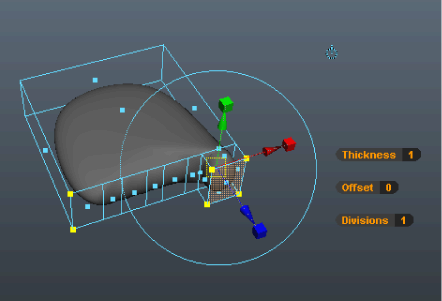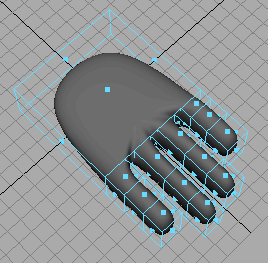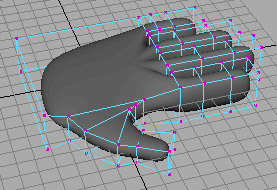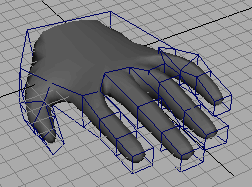Next, you’ll extrude faces to create fingers for the hand.
To extrude the polygon faces to create fingers
- In a perspective view, right-click LeftHand and select from the marking menu.
This lets you select faces.
- Select the right-most face. (The subsequent illustration shows which face to select.)
- Select .
- Drag the blue arrow manipulator outward a little to create the first segment of the smallest finger.
The blue arrow turns yellow when selected.
TipYou can also enter 1 in the field to create the first segment.
Note
Do not be alarmed if the small dots at the center of each face do not appear. This means you are in mode, which makes no difference for this tutorial. If you want to switch to mode, you can do this by opening the Maya preferences () and then selecting the section. You can toggle the face selection mode from here.
- Repeat the prior two steps to create the middle segment of the smallest finger.
NoteYou can enter 1.5 in the field to create the second segment.
- Repeat the prior two steps once again to create the top segment and complete the finger.
NoteYou can enter 2 in the field to create the third segment.
By creating three segments for a finger, you mimic a real finger’s natural structure. The borders between the segments have
vertices (not displayed currently) that let you reshape those regions, for instance, to create knuckles.
- Similarly, extrude the ring, middle, and index fingers from the appropriate wide faces. Don’t extrude the three small faces
that lie between the wide spaces. Leave them in position to allow for webbing between the fingers.
Note
Do not be concerned if the hand you create does not match the lesson’s illustrations. Your goal in this lesson is to learn
the workflow of subdivision surfaces, not to perfect your modeling technique.
Next, you extrude a thumb using similar techniques as you used for the fingers. The following steps are abbreviated. See the
preceding pages for details on the described tools, if necessary.
To split and extrude a face for the thumb
- Select LeftHand.
Make sure it is highlighted in green in the scene view. If it is not green, select LeftHand in the Outliner.
- Use to split the side face in the thumb region into three faces.
While splitting, make sure the middle face is larger than the outer faces as shown below.
- Extrude the middle face and drag it directly outward.
- Click the surrounding blue circle and use the rotate manipulator to aim it in a direction appropriate for a thumb.
- Extrude three times more to create each segment of the thumb. Use the extrusion manipulator to rotate, move, and scale each
extrusion to create the desired shape of a thumb. Use the following figure as a guideline. Again, it’s unnecessary to match
the illustration or create a realistic thumb for this lesson.
The extrusion manipulator is easy to figure out by clicking and dragging its various elements. If necessary, you can also
use the conventional Move, Scale, and Rotate Tools to reshape the faces that control the thumb’s shape.
- In the scene view, right-click LeftHand and select Vertex from the marking menu. The purple vertices at the corners of the
faces control the adjacent region of the hand.
- Make coarse adjustments to various parts of the hand by repositioning the vertices with the Move, Scale, and Rotate Tools.
The works on individual vertices or groups of vertices. Rotate and Scale works on two or more vertices. Undo any changes you
don’t like using Ctrl-Z (Windows and Linux) or Control-z (Mac OS X).
Try to create the approximate thickness, length, and curvature of a cartoon character’s hand and fingers. There’s no need
for perfection. You’ll refine the fingers later.






